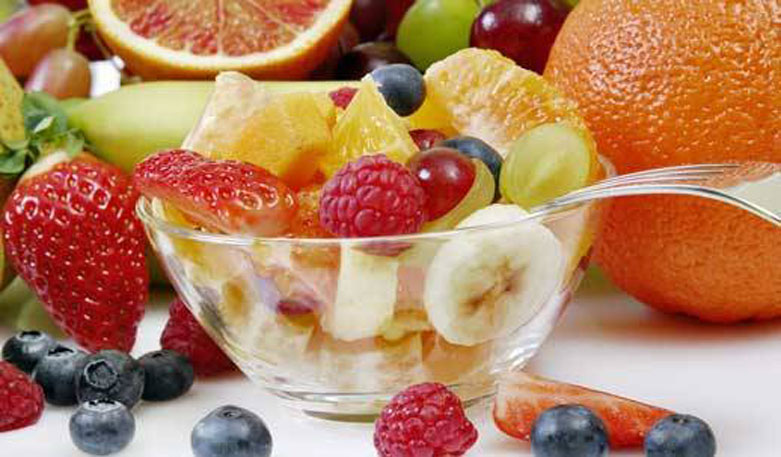A full day usually leaves little time for a varied diet and sporting activities. Nutrition is of great importance when it comes to maintaining concentration and mental fitness over the course of the day. Because the human body needs sufficient energy for continuous performance.
About 15 percent of the daily energy requirement is consumed by our brain alone, which is supplied with nutrients and oxygen via the bloodstream. Everyone is subject to certain performance fluctuations during the course of the day. The performance curve rises steeply in the early morning and reaches its peak in the morning. At noon, the performance drops noticeably, but increases again in the afternoon. The be-all and end-all of optimal mental performance are regular meals. Three main meals and two smaller snacks a day are recommended. The digestive organs are less stressed than with three large meals, and the blood sugar level is kept constant.
However, not only the timing of the meals, but also the selection of the food plays an important role. In addition to drinks, a balanced diet includes six food groups that should be included in the menu every day if possible: fruit and vegetables, grain products or potatoes, milk and dairy products including cheese, as well as meat, fish or eggs and high-quality fats/oils.
The best way to start the day: the right breakfast
If you need to be efficient and focused throughout the day, you should take enough time in the morning for the first meal of the day. After all, the body needs new energy and nutrients after the long night break from eating. A balanced breakfast is therefore the ideal basis for a fit start to the day. Muesli with milk, yoghurt or quark, wholemeal bread with cheese or a latte with a grain roll are the “starters” for the body’s own motor. Milk and dairy products provide the body with easily digestible energy in the form of milk fat and lactose. The vitamins it contains – especially the B vitamins – and minerals ensure a rapid supply of energy, strong nerves and the smooth running of numerous metabolic functions.
If you don’t have an appetite early in the morning, you should at least have a glass of milk or buttermilk, a milkshake with fresh fruit, a latte, a glass of fruit juice or yoghurt. The second breakfast should be correspondingly richer, eg wholemeal bread with cream cheese or quark, fresh fruit or raw vegetables.
Small breaks increase well-being
The performance curve drops after three to four hours of concentrated work at the latest. The muscles tense up, the concentration decreases and one becomes more susceptible to stress. Regular breaks in everyday work maintain performance and give you new strength. When you’re stressed and hectic, it often helps to breathe deeply into your stomach a few times and breathe out very slowly and consciously. Even a short walk around the block often works wonders. The following exercise is useful for relieving tension in the throat and neck muscles: Sit on a chair with your back straight, then reach over your head with your right arm to your left ear and slowly pull your head to the right. Stretch the muscles in this position for about five seconds, and then repeat the exercise with your left arm.
The second breakfast – snacking around the 11 o’clock hole
By eleven o’clock in the morning at the latest, the batteries are usually empty and concentration is slacking. The second breakfast helps to absorb this drop in performance and soften the midday nadir. Nutrition experts recommend covering a third of the daily energy requirement with the first and second breakfast. The second breakfast is particularly important for an optimal supply of energy, vitamins and minerals, especially for people who are up very early in the morning or eat little. Combinations of milk products with fruit and vegetables are ideal, eg a milkshake with fruit or quark with vegetable sticks. Snacks with dairy products are easy to digest, contain vital vitamins and minerals and are also versatile and quick to prepare. Milk, quark and co. are therefore ideal foods against physical and mental low points.
Fit through the lunch break
If the lunch is too rich, the digestive organs are overburdened. As a result, we get tired and would rather take a little nap than get back to work. Only 25-30 percent of the total daily amount of energy – for an office job this corresponds to around 500-600 kilocalories – should be taken in with lunch. An easily digestible diet is recommended, especially if the activity is predominantly mental. Light dishes, such as a crispy salad with yoghurt dressing or a baked potato with herbal quark don’t weigh you down and give you a boost.
Final sprint in the afternoon and enjoyable end of the day
The performance curve rises again in the afternoon. In order to maintain the willingness to perform until the end of the day, a small snack is recommended. Finally, dinner provides an enjoyable end to the day for body and soul. After a strenuous and busy day, it offers the ideal opportunity to replenish lost energy and nutrients in a relaxed atmosphere. It forms the perfect conclusion to an active and productive day



